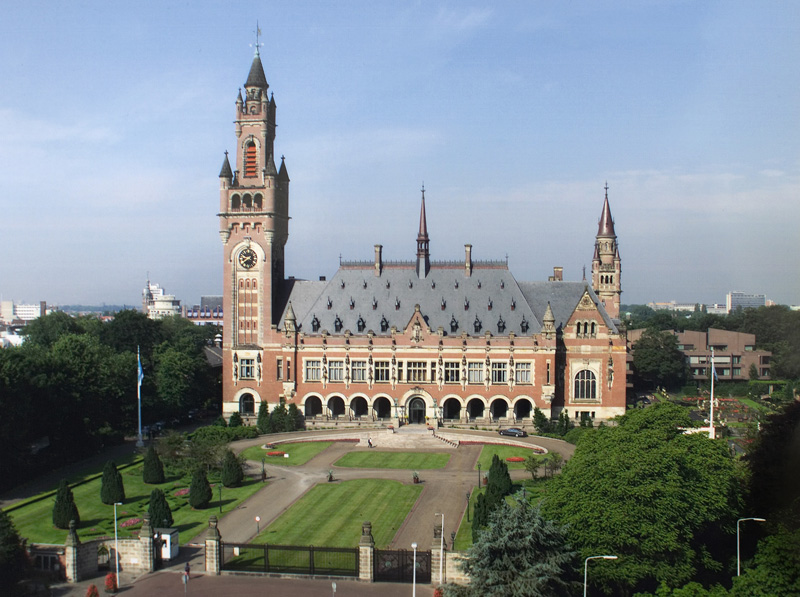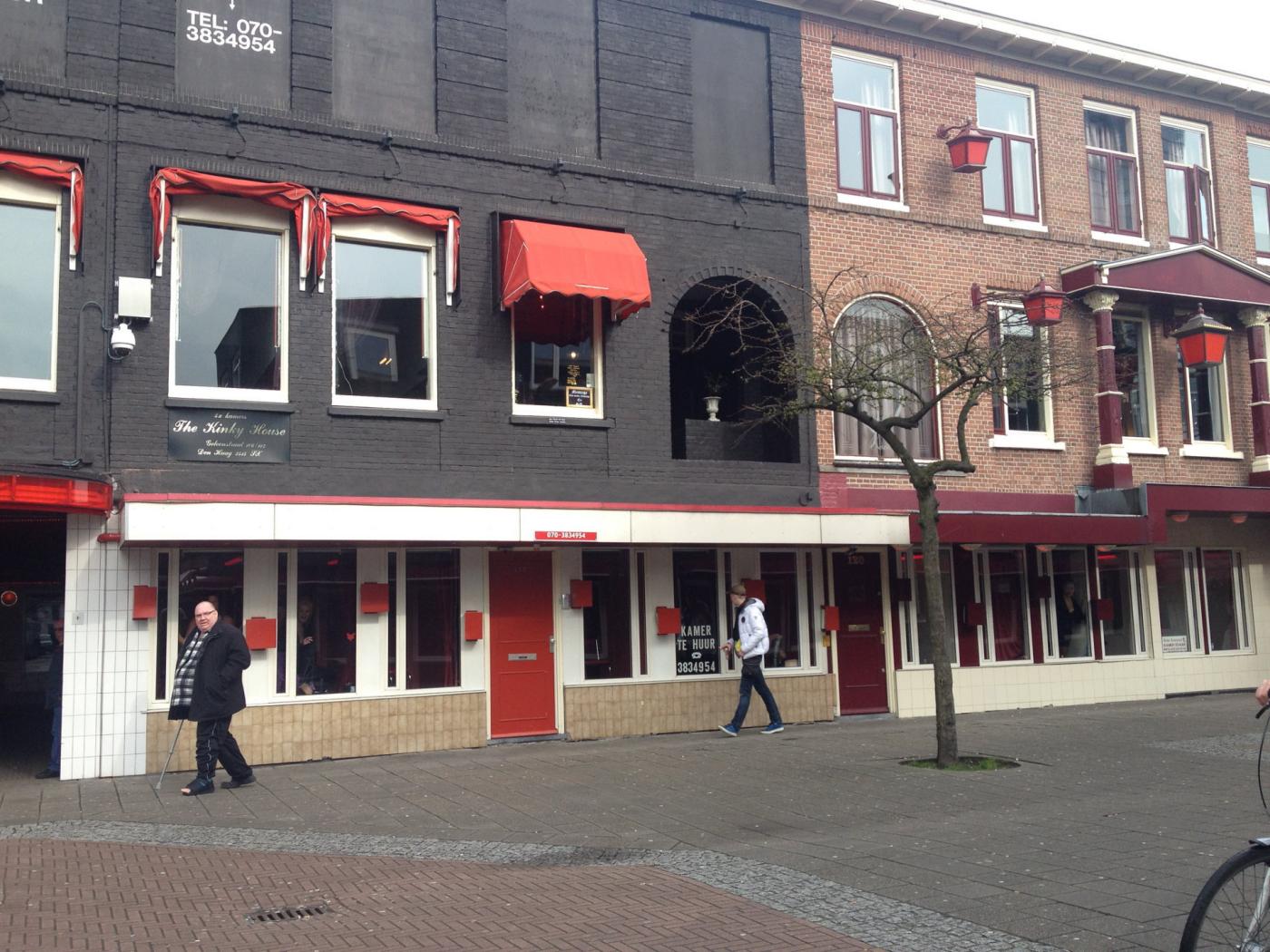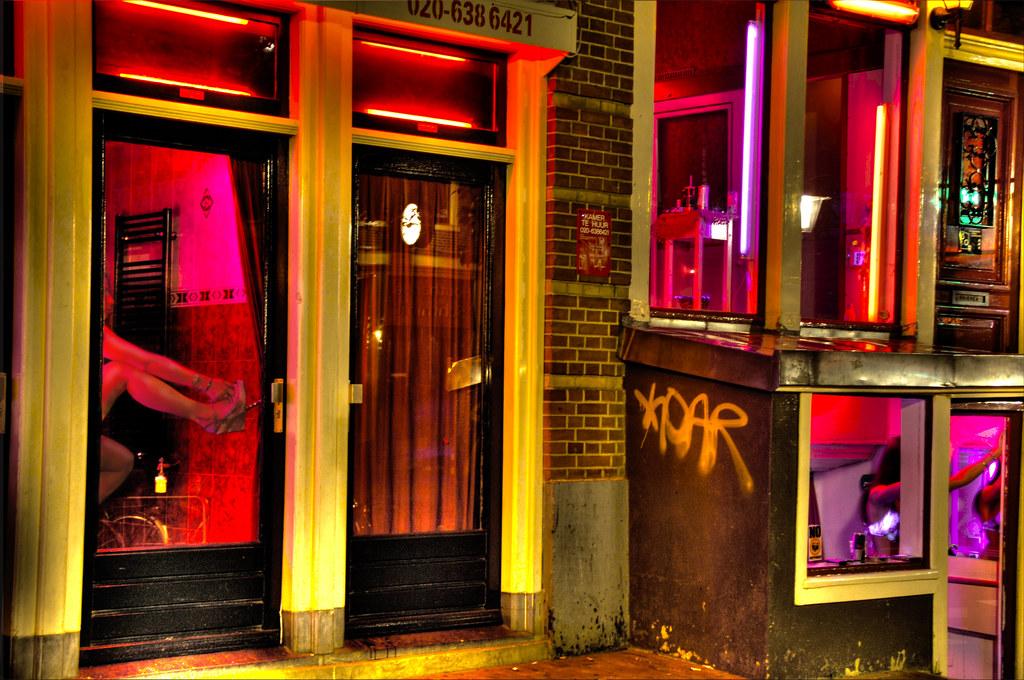Every morning, the family Eszter was staying with woke her up and hurried her off to the tram to work.
But instead of heading to an office, she went to one of The Hague’s legal prostitution streets to appear in a luridly lit window and wait for clients. She was allowed home at night only after having brought in 600 euros. Sometimes she worked 16 hours straight, watched by an in-law to keep her in line. She was given a “work” cell phone for incoming calls only.
If Eszter came home especially late, her hosts — a family she had known since her childhood in Hungary — would tell her to keep her shower short. She had to be rested for another long day of prostitution. She often headed out again in the morning without washing off the previous day’s work.
And she never saw any of the money she made during the two years she was forced to sell sex.
The Hague is home to the U.N.’s International Court of Justice and the International Criminal Court, where lawsuits are brought between states and where war criminals are tried.
 The International Court of Justice in The Hague. (Credit: International Court of Justice)
The International Court of Justice in The Hague. (Credit: International Court of Justice)
The self-declared Royal City by the Sea is also one of many places in Western Europe where women are forced to sit behind windows and offer sexual services to passersby.
Estzer was brought there by a family of four sisters, a brother, and four of their spouses, all of whom were convicted in local court in March 2018 of human trafficking, money laundering, and being part of a criminal organization.
Case documents provide an unusually vivid and detailed look at how women are trafficked into the Netherlands, and kept pliant through fabricated debts and real threats.
Many are from Hungary, Romania, and Bulgaria, European Union member states where poverty is still rife and travel to Western Europe is unrestricted.
Hungarian trafficking victims can be hard to help, because they do not readily step forward, are not well represented in Dutch society, and are easily moved between Hungary and the Netherlands, said Ina Hut, director of CoMensha, a non-profit that monitors and raises awareness of human trafficking.
The main suspects in Eszter’s case, Sandor B. and his wife Erika B., were each sentenced to 41 months in prison. The other perpetrators got as little five months. The court of The Hague and Dutch prosecutors denied repeated requests by OCCRP to disclose the full names of the convicted traffickers.
What is clear is that Family B. was at the helm of a sophisticated mid-sized trafficking ring. Over the course of about four years, they lured around 20 young women from Hungary to the Netherlands, according to prosecutors, promising riches through easy work and the prospect of upward mobility.
Once their victims arrived in The Hague, they were forced to sit behind display windows and offer sexual services, and to surrender most or all of their earnings. Some were also sent to work as prostitutes in Austria and Germany.
All the women were teenagers or in their early 20s, trying to escape poverty in Hungary. The family even trafficked one underage girl, although she did not work as a prostitute because she was too young.
Many of the young women became emotionally dependent on their enslavers, whom they saw as substitute parents.
“I really loved these people,” said one. “And they made me believe that they loved me like their child.”
In reality, they were constantly watched. They lived with Family B. and their belongings were taken from them. They were romantically and socially paired with acquaintances of the family so they could also be monitored during their free time. Sometimes, they were even supervised while having sex with clients.
The Family B. case is not an anomaly when it comes to sex trafficking in the Netherlands. While prostitution has been legal there since 1999, the profession is still susceptible to the influence of organized crime and human traffickers, especially when it comes to non-native sex workers who don’t know their legal rights.
In the Netherlands, a sex worker can be either an employee or an independent contractor. Qualifying as an employee requires a contract between both parties with clear agreements about working conditions and salary. The employer is responsible for creating a safe and clean work environment.
None of the Family B. suspects acted as employers or had formal contracts with the women they brought from Hungary, despite asserting control over their earnings.
Traffickers and pimps often recruit women from Eastern Europe or Africa by promising them good jobs in the Netherlands, explained Ina Hut of CoMensha.
“There are women, for example, who think they are going to be models or work in a restaurant, hotel or café, but end up in a bordello,” she said.
There are about 6,000 victims of human trafficking in the Netherlands every year, two-thirds of whom are coerced into the sex trade, according to a 2017 report by the National Rapporteur on Human Trafficking.
Hut estimates the real number of victims could be as many as 20,000. The number of formally identified “is very much behind on reality,” she said.
Moreover, the Dutch public tends to look away, seeing trafficking as something that only happens in far-away places, while victims are often in denial about their situation or too afraid or ashamed to come forward, Hut said.
“Very often you see that traffickers force them into substantial debts for the journey, which takes a very long time to pay back,” Hut said. “It’s always vulnerable people who are picked out.”
 A street in The Hague’s red-light district by day. (Credit: Scott Edmunds/CC-by-SA-4.0)
A street in The Hague’s red-light district by day. (Credit: Scott Edmunds/CC-by-SA-4.0)
From Small-Town Hungary to Doubletstraat
A 20-minute bike ride from the International Criminal Court lies Doubletstraat, one of the Netherlands’ most notorious areas for what is known as “window prostitution.” Almost every house along the cobblestone street features a woman in lingerie sitting or standing behind a tall window, bathed in red, pink, or purple light.
Some of the women point or wave to grab the attention of men walking by. Others adjust their clothes and makeup in front of small mirrors in the rooms. Potential clients glance at every window they pass to see what’s on offer.
“Hi, how’s it going?” a man asks in a video of the street posted on YouTube in January 2019. “How much is it just to fuck?”
“30 euros,” the woman replies. “For 15 minutes.”
“I’ll think about it,” the man says as he walks to the next window.
Branching out from the street are small alleyways leading to mazes of more red-lit windows and women, oglers and drunks.
In June 2018, The Hague’s municipal board voted to move its legal prostitution areas outside the gentrifying city center. Amid concerns that this would put sex workers at greater risk of exploitation and increase illegal prostitution, the city has still not decided how to implement the decision, a spokesperson told OCCRP this month.
These windows are where most of the women brought to The Hague by Family B. were made to display themselves, luring in customers with provocative gestures.
For Estzer, it was critical to attract enough clients every day to meet the 600-euro target set by her captors. If she failed, she would be berated.
Like the other women brought to The Hague, Estzer grew up poor in small-town Hungary, where she lived in a single room with her mother, her child, and three nieces and nephews.
A friend introduced Estzer to drugs as a way to escape. The same friend suggested that she talk to Sandor and Erika B. about a work opportunity in Western Europe.
The couple had formerly lived in the same Hungarian town, and she had visited their home many times as a child.
Sandor and Erika told Estzer she could make a lot of money in the Netherlands, like another Hungarian girl they were already helping.
The suspects “knew that Estzer and her family did not have any money,” according to a paraphrase of a statement she gave to prosecutors. “They couldn’t even light their stove.”
Sandor offered to arrange the trip, find her a place to live, and get her a job. She could pay him back later and go home every weekend, he said. The couple promised to look after her as if she were their own daughter.
Convinced of their good intentions, Estzer agreed to head to the Netherlands in a car driven by two family B. members and an accomplice.
Three days after her arrival, Sandor and Erika informed Estzer that she owed them 5,000 euros for the trip and needed to repay them by working as a prostitute.
It was not clear how they came up with that figure (a plane ticket from Budapest to Amsterdam, the nearest airport to The Hague, costs around $200 at most), but they used her supposed debt as an excuse to watch Estzer constantly. Even when she was having sex with clients, the sister of one defendant would stand across from her or behind her to watch her performance.
In court documents, the Hungarian girl the couple used as an example to convince Estzer is called Anna. She was 18 years old when Family B. brought her to The Hague in 2010.
Anna told prosecutors that she’d had a difficult upbringing, but didn’t know anything about prostitution until her then-boyfriend presented it as an easy way to make money. He introduced her to Erika and Sandor, who said they would employ her and put her up in the Netherlands if she paid them 50 euros per day.
In November 2010, Anna took a bus from Budapest to the Netherlands, accompanied by a female friend of the couple. A member of Family B. met Anna and her chaperone and brought them to the same house Estzer would later move into.
The next day, Family B. took Anna to Doubletstraat and set her up in front of a window. From then until Christmas, Anna worked every day from 10:30 a.m. until midnight.
In addition to making her repay her purported expenses, Family B. told her she had to support the woman who had escorted her to the Netherlands.
Anna told the court that Erika and Sandor abused her psychologically, convincing her that they loved her like a daughter and that she could help them by offering her body to strangers.
Around Christmas, Anna decided she didn’t want to work as a prostitute anymore and returned to Hungary. Erika and Sandor lured her back to the Netherlands by promising that she wouldn’t have to support her chaperone anymore.
Instead, they made her hand over a greater proportion of her earnings to them. At one point, they even sent her to Germany to work as a prostitute in a sauna facility before bringing her back to the Netherlands.
Family B. told Anna she needed to bring in at least 750 euros a day and give them half the money, even when she was sick.
One day when Anna had made 725 euros and went home because she felt tired, the couple yelled at her, saying she hadn’t made enough.
Tired of the abuse, she decided to go back home. This time the family warned Anna not to forget that they all came from the same town, and that there would be consequences if she went to the police.
Scared for the safety of her family in Hungary, Anna looked for a different way out. She negotiated with her captors, who said she could leave without consequences if she paid them an additional 4,000 euros.
After scraping the money together, Anna left for her hometown, a year after she had first been convinced to go to the Netherlands. But it wasn’t the end of the harassment by Family B. In Hungary, she was constantly watched by relatives of Sandor and Erika. At one point, they told Anna that she would get her 4,000 euros back if she would start doing sex work for them again.
Anna agreed and went back to The Hague. She never saw any of the promised money.
 Window prostitution in Amsterdam’s red-light district, which is similar to the one in The Hague. (Credit: Trey Ratcliff/CC BY-NC-SA 2.0)
Window prostitution in Amsterdam’s red-light district, which is similar to the one in The Hague. (Credit: Trey Ratcliff/CC BY-NC-SA 2.0)
Trophy Horse
In the meantime, Sandor had brought over more women from Hungary by using Anna as an example of “how nice it was to do this.” The family pitted them against each other to see who could earn the most in a day, holding up Anna as the top earner.
Anna said her status made her feel like a trophy horse.
One of the women overheard Anna being told to not use condoms so she would make more money. The women witnessed how Family B. “treated her in a very ugly way” and that Anna was terrified of them.
“Whenever they started yelling at her, she would make herself small and turn in on herself,” one said.
Estzer also said the family often compared her to other women.
Family B. demanded Estzer work more hours and give them more money. At the same time they increased their control over her life. Estzer decided she had to escape, despite threats against her family back home. She met an Iraqi man through her work and thought he would be a trustworthy accomplice. He helped Estzer escape to England.
Two other girls enslaved and imprisoned by Family B. escaped by climbing out the window of one of the family’s apartments, jumping onto the neighbors’ balcony and making their way down into the street where they asked passers-by to call the police.
In court, a Family B. accomplice identified only as P.T. acknowledged that one of the trafficked women, known as Lila, was his niece, and testified that she was not “mentally capable” and had abandoned her children in Hungary.
Lila sent the following text messages to a different Family B. accomplice between 1:48 and 1:52 a.m. in November 2013, according to court documents: “I don’t know, it’s pointless, I work for nothing. I don’t know what should I do; either I don’t continue or I will do something, I cannot send any money home.
“It cannot go on like this, it is not good for me, I cannot even keep 30 or 40 euros aside, I still have expenses, it’s pointless.”
At 10 in the morning of the same day, Lila expressed her concerns in a telephone call to the same person.
She told her interlocutor she was trying everything to get clients, offering them cut-rate prices of 20 euros, hurrying them up, and telling them to “do it faster” and “climax fast.” She said she was giving it her all.
Two days later, Lila called the same person again and began to cry, saying she didn’t want to work as a prostitute any longer. A week later, Lila protested that she was sick. She was told that she had to earn her “window money” anyway.
The court concluded that the nine members of the B. Family and one unrelated defendant, fully aware of Lila’s poverty, worked together to transport her to the Netherlands, saddle her with debt, pressure her to give them money, and sexually exploit her.
They did the same to at least 15 other young women, the court found.
It is unclear what happened to all the victims of Family B., since their full identities remain anonymous by court order. Ina Hut said that in general, some victims return to their home countries while others continue working in the sex industry.
“Sometimes returning back is not an option because of a feeling of shame for the kind of work they did,” she said.






